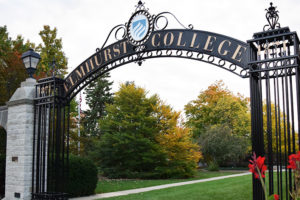
The sky is no limit for famed astrophysicist Neil deGrasse Tyson, who during an April 4 presentation to an enthusiastic, packed house at Elmhurst College advocated turning “the solar system into our backyard” to supercharge scientific study in the United States.
The U.S. is losing its leadership in research and innovation, Tyson said, tracing the start of the decline to the last moon landing in 1972. Since then, the U.S. has steadily cut back on space exploration, and he cited that as a major factor in the erosion of interest in the sciences and engineering.
Tyson’s prescription is to “reinvigorate the innovation culture that prevailed at the time we were going to the moon,” but with even loftier goals.
“I say, let’s do it all. Space should not be about single destinations. Space should be about, let’s turn the entire solar system into our backyard, and let’s do it all at once,” Tyson told a sold-out audience of 1,000 at Hammerschmidt Memorial Chapel.
“If the nation goes to space in a big way—goes to the moon, to Mars, visits asteroids—if the whole solar system becomes our backyard, the whole STEM field is represented: biologists, chemists and astrophysicists, and the whole portfolio of engineers.
“When you do that, you transform this country into an innovation nation, which is not what we are now.”
Tyson’s lecture, Cosmic Perspective, sold out months in advance. At the conclusion of his nearly two-hour talk, the audience gave him a standing ovation and then sat back down for an encore, as Tyson fielded questions from the audience for another hour.
He encouraged people to look at the big picture—the really big picture—to gain perspective on their role in the universe.
Humans “are just a participant in the tree of life,” one of thousands of species that inhabit the earth, he said, and the Earth is just a speck in the universe, which contains countless other galaxies besides the Milky Way.
“Everything I’ve ever seen in the universe tells me that nothing is ever made in ones. Our universe is large enough and old enough to find more of whatever you thought was unique,” said Tyson, director of the Hayden Planetarium in New York and former host of the PBS program NOVA ScienceNow.
Though most humans think of themselves as superior to other animals, he said, “We’re not made of some special or rare ingredients. We are from the same stuff that is everywhere in the universe. We have an atomic kinship with the universe and a chemical kinship with all other matter in our solar system.
“So often, people are asking what their place is in the world. The real question is, what is your place in the universe?”
He spoke pessimistically about the extent to which the United States is—and might remain—a dominant global force in the areas of scientific research and space exploration.
As an example, Tyson described the real possibility that, in our lifetime, a giant asteroid will smash into the Pacific Ocean off the coast of Southern California. With scientific precision, he pinpointed the projected date of impact—April 13, 2036 (a Thursday), and said planning is under way to try to deflect the path of the asteroid, dubbed Apophis by scientists.
Russia, he said, has taken the lead in discussions to deflect Apophis. The fact that the U.S. is a follower in the project, even though the greatest impact would be on this country, is a “sign of the fading of America” as the leader of the global scientific community.
“We’re beginning to fade, and that means you become less relevant on the world stage. People don’t look in your direction for guidance,” he said.
In the 1960s, when Americans dreamed of the future, they had grand visions inspired by space exploration, and that “shaped our culture,” he said. “Now, nobody dreams that anymore.”
Worse, the amount of scientific research published in the last decade has increased rapidly in Japan, China, Western Europe and Brazil, but by comparison is shrinking in the U.S. “That’s the future of the world,” he said. “That should scare the hell out of us here in America.”
Before his lecture, Tyson spent more than an hour with students and faculty, sharing stories about his personal life and answering questions, including one about the meaning of life.
“The very question is misguided in a fundamental way,” he responded. “It pre-supposes that meaning and happiness are to be looked for and possibly found behind a tree or under a rock.
“The happiest people I know don’t search for anything. They manufacture their own meaning and create their own happiness. Then, your life is about what you’ve created, not so much what you’ve looked for and only possibly found.”